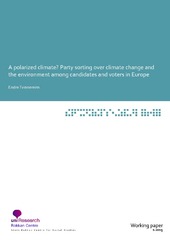| dc.contributor.author | Tvinnereim, Endre | |
| dc.date.accessioned | 2018-01-10T14:53:49Z | |
| dc.date.accessioned | 2020-12-10T06:24:44Z | |
| dc.date.available | 2018-01-10T14:53:49Z | |
| dc.date.available | 2020-12-10T06:24:44Z | |
| dc.date.issued | 2015-05 | |
| dc.identifier.issn | 1503-0946 | |
| dc.identifier.uri | https://hdl.handle.net/1956/17176 | |
| dc.description.abstract | Political polarization over climate change has been blamed for lack of climate policy progress in several countries, most notably the US and Australia. However, no systematic comparative study exists of party sorting – the degree to which opinion on a given issue correlates with partisan attachment – over climate change and the environment. This article develops a measure of such party sorting using both individual‐level party candidate and voter data for the two largest parties in each country. It shows that party sorting over these issues varies strongly across 15 developed countries, with Danish candidates for political office disagreeing the most. Furthermore, it shows that this variation is largely mirrored among the voting public. Surprisingly and contrary to existing argument based on single‐country cases, this comparative study finds that party sorting is not associated with less effective climate policy, but rather that the opposite might be the case | en_US |
| dc.language.iso | eng | eng |
| dc.publisher | Stein Rokkan Centre for Social Studies | eng |
| dc.relation.ispartofseries | Working paper; 1-2015 | eng |
| dc.subject | climate change | eng |
| dc.subject | environment | eng |
| dc.subject | polarization | eng |
| dc.subject | parties | eng |
| dc.subject | climate policy | eng |
| dc.title | A polarized climate? Party sorting over climate change and the environment among candidates and voters in Europe | eng |
| dc.type | Working paper | eng |
| dc.rights.holder | Copyright Stein Rokkan Centre for Social Studies. All rights reserved. | eng |
| dc.description.version | publishedVersion | |
